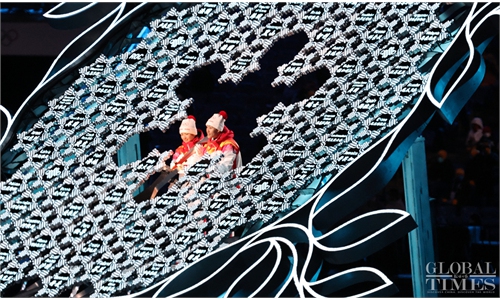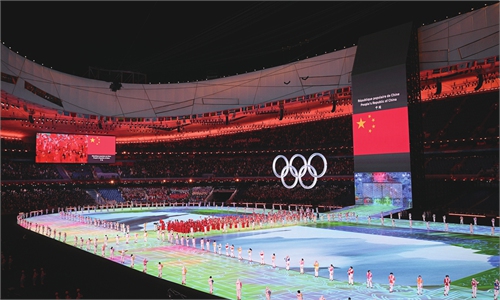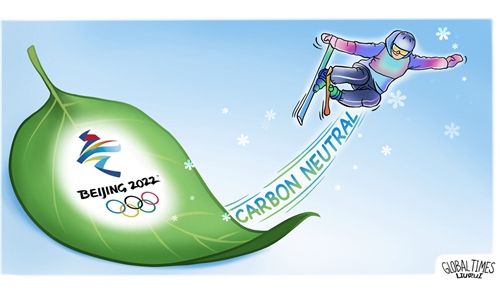Olympics showcase China as a green development trailblazer

Illustration: Chen Xia/GT
The wonderful appearance of LEDs during the opening ceremony of the Beijing Winter Olympics reminded me of the 2008 Summer Olympics in Beijing. That opening ceremony used a ground-level LED screen, 3,234 square meters in area, but many parts, especially key components, were imported from abroad.14 years later, the world's largest LED screen was unveiled at the opening of the Winter Olympics, measuring 10,552 square meters with over 40,000 LED modules, featuring ultra-high resolution of 16K, with components basically all made in China.
Of course, China's LED development, in general, is still at the midstream level. The US, Germany and Japan hold the upper reaches of cutting-edge technology. But China has established a complete production chain and a complete LED industry chain. The US, Germany and Japan's high-end technology to be applied to end products on a large scale, still needs the support of the Chinese manufacturing industry.
The LED industry in China symbolizes the status of Chinese manufacturing in the global industrial chain, and in fact, it is also why the US containment policy on China will backfire.
The Beijing Winter Olympics are also a continuation and expansion of the Green Olympics. In 1994, I went to Lillehammer, Norway to cover the Winter Olympics, and it was because of the efforts of the Norwegians that environmental protection became a goal pursued by the international Olympic movement from that year onwards.
Twenty-eight years on, the Beijing Winter Olympics set a new global benchmark for environmental protection. A non-Western, populous, and world's largest developing country has fulfilled its global commitment to go green.
My friend Du Shaozhong, who was the deputy head of Beijing's Environmental Protection Bureau back then, gave more than 1,000 interviews to overseas media in 2008 and has been trying to convince overseas audiences to believe in China.
And since last year, Beijing no longer needs to hold air quality briefings. Let's look at the nitpicking foreign media, especially the Western media. This topic has apparently been forgotten because they can't find a launching point on this issue, and green has become the true color of China and its manufacturing development.
It's not difficult to see the changes in China. A common problem Westerners have is that they do not ask themselves how China has accomplished such changes. Most fundamentally, they do not make a comparison between China's development and the historical practice of Western countries toward development. They simply marvel at China's development and transcendence, and as a result, they also develop a sense of apprehension.
If one were to compare China's development with that of the West, it becomes clear that there are at least two points of difference.
First, the overall improvement of Chinese manufacturing and its active push in the global market have not brought wars and conflicts to the world, as the expansion of Western capital power did in the past. The development of Chinese manufacturing has benefited the world by providing the West with the possibility of low inflation, and by lowering the threshold of globalization for developing countries, especially poor ones.
Second, Chinese companies and Made in China have gone global without transferring pollution overseas like Western countries did. China's early development since its reform and opening-up has endured the transfer of pollution from Western companies, and since 2008, China has achieved its green goal of environmental protection entirely through its own efforts.
China will not follow the same path of the global expansion and capital power of Western countries. Anyone who is willing to look carefully at China's changes since the 2008 Beijing Olympics can see the country's choice to forge its own development path, and especially its goal of ensuring the common prosperity of the Chinese people. China's foreign policy, even if it is often identified by the West as increasingly aggressive, actually sets its own course along this path.
The author is a senior editor with People's Daily, and currently a senior fellow with the Chongyang Institute for Financial Studies at Renmin University of China. dinggang@globaltimes.com.cn. Follow him on Twitter @dinggangchina




